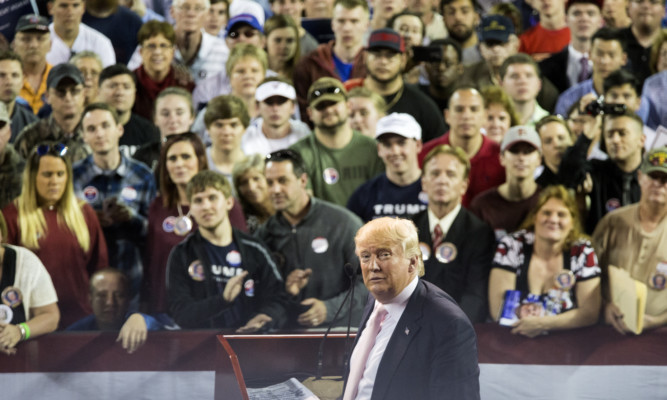On the eve of Tuesday’s crucial multi-state primaries, a sharp new divide erupted between Republicans over the party’s frontrunner, billionaire tycoon Donald Trump.
The split is between those who pledge to fall in line behind him if he wins the nomination and others who insist they can never back him.
It could have major implications beyond the primaries, exposing the looming challenges in uniting the party, no matter who wins the nomination.
Mr Trump has won three of four early nominating contests, surprising a party that had assumed his populist appeal with voters would fizzle out.
Instead, he has only grown stronger and appears to be in commanding position heading into Super Tuesday, the biggest single-day delegate haul of the year.
Republicans will vote in 11 states on Tuesday, with 595 delegates to the party’s national nominating convention at stake. It takes 1,237 delegates to win the nomination at the July convention.
If Mr Trump sweeps most of the states up for grabs, he could amass a delegate lead that would be difficult for any rival to overcome.
Texas senator Ted Cruz is banking on a win in his home state to keep him in the race, while Florida senator Marco Rubio wants to stay close in the delegate count until the primary in his home state on March 15.
Meanwhile, Democratic frontrunner Hillary Clinton is solidifying her lead. Like Mr Trump, she could begin putting her party’s nomination out of reach for rival Bernie Sanders with a strong showing on Super Tuesday. Democrats will be voting in 11 states and American Samoa, with 865 delegates at stake.
After a decisive victory in Saturday’s South Carolina primary, Mrs Clinton has shed nearly all references to her Democratic opponent, choosing instead to focus on Mr Trump.
Mr Sanders, meanwhile, remains resolute in his message, offering his standard economic-focused campaign speech and looking past last weekend’s defeat.
With Mr Sanders lagging in delegates and likely to face more losses on Super Tuesday, Mrs Clinton’s team is starting to become more concerned with the need to eventually unify the party.
They are trying to avoid further alienating the passionate Sanders backers, whose support she will need to win a general election, and remind Democratic voters that she could face Mr Trump – a hated figure in the party.
Republicans face a more daunting challenge in uniting their party, and Nebraska’s Ben Sasse, a rising star among conservatives, became the first current senator to raise the prospect of backing a third party option if Mr Trump clinches the nomination.
He urged Republicans to consider whether a party led by Mr Trump would still represent their interests.
“If our party is no longer working for the things we believe in … then people of good conscience should stop supporting that party until it is reformed,” he said.
Other Republican leaders were less explicit, but sent similar messages on Monday, particularly in light of Mr Trump’s refusal to immediately disavow former Ku Klux Klan leader David Duke’s support.
Mitt Romney, the party’s 2012 nominee, called that “disqualifying” and South Carolina governor Nikki Haley said she would “not stop fighting a man who refuses to disavow the KKK”. The Klan advocates white supremacy, and has sometimes used violence.
Mr Trump said he had not understood the CNN interviewer who first raised the question about Mr Duke’s endorsement, and he did later repudiate him.
The Associated Press asked Republican senators and governors across the country if they would back Mr Trump if he secured the nomination.
Just under half of those who responded would not commit to backing him, foreshadowing a potentially extraordinary break this autumn.
Tensions boiled over during Mr Trump’s rally in Monday in Radford, Virginia, where he was repeatedly disrupted by demonstrators, including 20 or more chanting “Black lives matter”.
He ordered several people to be removed, then cast himself as a unifying political force, saying: “Believe it or not, we’re going to unify this country.”
